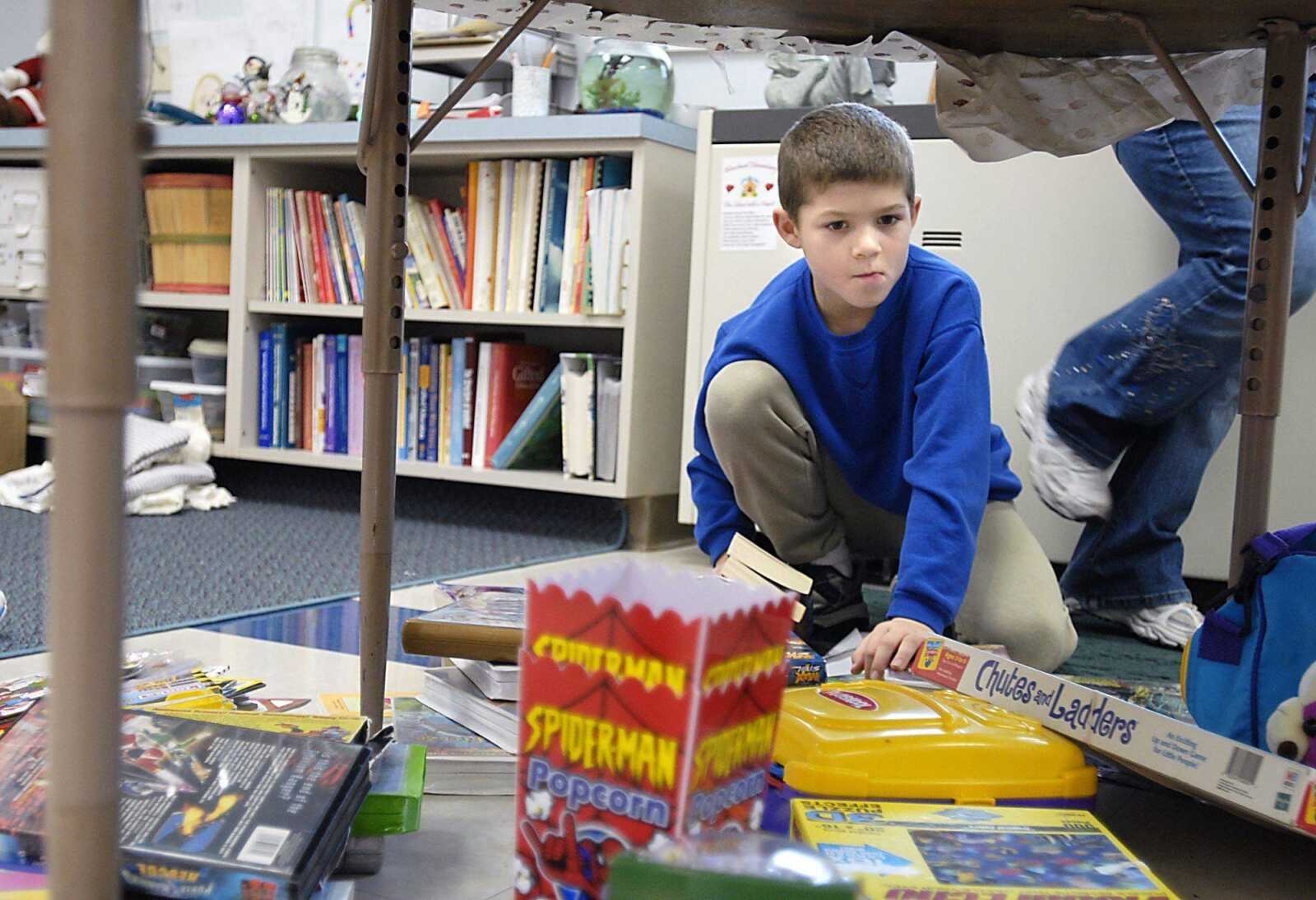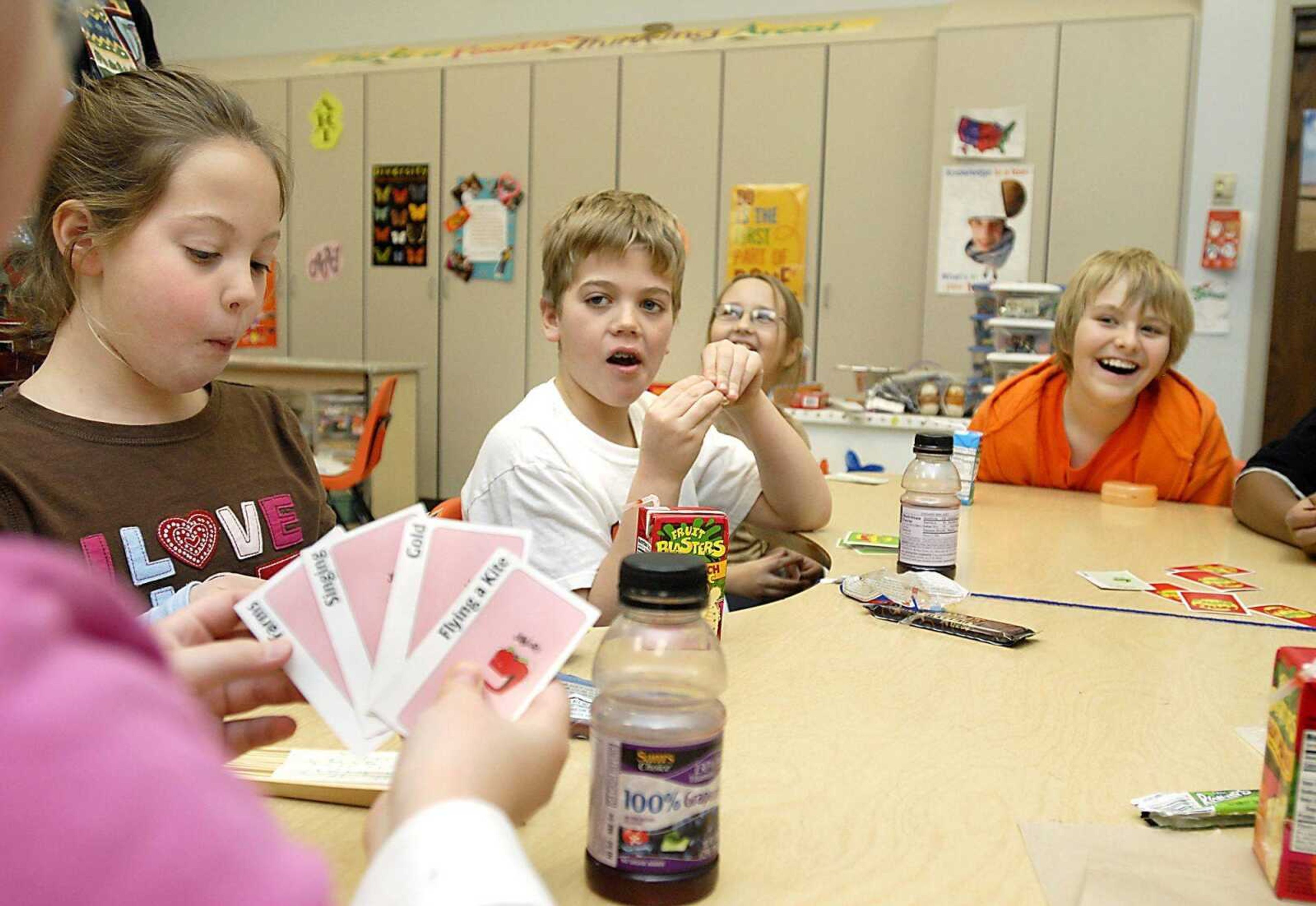Educators worry gifted students will be overlooked
Second-grader Drake Mills doesn't know about the politics behind his education. He's just excited to come to the Explore program every Monday, one afternoon a week he can join like-minded students who enjoy a challenge. Larger districts, like Cape Girardeau and Jackson, can afford gifted pullout programs, where talented students attend a half-day session once a week...
Second-grader Drake Mills doesn't know about the politics behind his education. He's just excited to come to the Explore program every Monday, one afternoon a week he can join like-minded students who enjoy a challenge.
Larger districts, like Cape Girardeau and Jackson, can afford gifted pullout programs, where talented students attend a half-day session once a week.
This is by far not the best method, gifted experts say. But parents, wary of losing services, admit it is better than nothing.
"The current trend is very clear: keeping the kids in the classroom with other kids and trying to differentiate in the classroom. Is that the ideal way? Absolutely not. It's hard for the teachers," said Stephanie Tolan, a national gifted expert and author of more than 30 articles on gifted education.
When Mills is not at Explore, he attends a traditional class at Franklin Elementary. It is up to his teacher to "differentiate" his instruction to meet his, and the rest of his classmates', individual needs.

For some teachers, this requires the time-consuming task of planning multiple activities or discussion questions within a single lesson to reach students at varying levels.
But more often than not, the pressure falls on teachers and administrators to direct resources to the neediest and lowest students.
As No Child Left Behind legislation marches on, consequences for schools failing to meet standards have become more stringent.
The mentality that profoundly intelligent children will "be OK" on state tests has "taken the focus off them a little bit," said Tanda Smith, a teacher for gifted students at Central Middle School.
Teachers, forced to spend time with less independent or lower-performing students, can find it hard to incorporate challenging activities for those already ahead.
Mills finishes most of his work early, he said, so the 8-year-old brings division problems from home to complete.
"They're problems my mom made," he said.
"Parents are going to have to end up doing the extra the kids need themselves a good part of the time," Tolan said.
Thinking critically
Some people think a child who can compute math problems above grade level or read a difficult word is automatically gifted. In reality, the identification of a child as "gifted" hinges on higher-order thinking skills, teachers say. The ability to think critically or approach problems creatively could indicate a gifted student.
Explore and Alert, Jackson's gifted programs, do not teach material at an accelerated pace. Instead, they focus on critical thinking, creative thinking and communication skills.
One day last week, gifted teacher Leslie Wright-Essner gathered students on the carpet for "crazy and creative thinking time."
Her room at Blanchard Elementary is different from most: There are no desks, and Wright-Essner sees only three to eight students at a time.
The teacher presented a drawing to students and asked them to create a story about the drawing.
"What makes a good storyteller?" Essner asked.
Three boys chimed in with responses, using vocabulary far beyond what would be expected of first- and-second graders: Storytellers make "facial expressions," they "elaborate" and they show "excitement," the students said.
The gifted program is particularly important in younger grades, where students spend a majority of their time in a general education classroom. By junior high, students begin to be tracked into level-specific courses, and by high school, advanced placement courses or dual-enrollment courses are available to students. However, in both Cape Girardeau and Jackson, gifted programs exist in higher grades.
"Forcing everyone to go at the same speed doesn't do favors for anyone," said parent Angela Keele, who has two children in Cape Girardeau's gifted program.
Special needs
In many districts, gifted students are classified as special education students because they are recognized as learning differently than the average student.
"Gifted students don't learn well by rote learning. Worksheet after worksheet after worksheet they don't like. They like creative types of activities, like problem solving," said Sally Holt, the former president of the Gifted Association of Missouri.
Hearing the same information three of four times turns them off to learning, and they can turn into underachievers who struggle when they get to college and have to try, Tolan said. "By grouping gifted students together with other gifted kids the complexity and speed of presentation is there," she said.
Staci Beussink, a gifted teacher in Jackson, said gifted students often have specific passions that can be cultivated in a smaller setting.
It is often only in a gifted classroom setting where students can associate with "someone else that is also passionate" or someone they can converse with, Smith said.
"They have a hard time finding that niche, and yes, fitting in. The everyday sixth-grader does not have concerns about global warming," like some of Smith's gifted students, she said.
Once a week, Nell-Holcomb gifted teacher Sue Rees makes toast for all her students, and they relax and discuss what it is like to be gifted.
"It's amazing how the con list grows so much quicker than the pro list," Rees said.
The expectation to always do well can present "a lot of pressure for a child," she said.
Meanwhile, No Child Left Behind legislation has put pressure on schools to get all students performing at grade level, something Holt worries may cause gifted students to be overlooked.
"What we would hope is that as we are raising the floor that we don't lower the ceiling for the more advanced students," she said.
Ignoring gifted students' needs can have global consequences, experts say. After all, gifted students are poised to become the future's next innovators, the source of ideas, the molders and shapers of the country.
They must be valued and nurtured in the right direction, Smith said.
lbavolek@semissourian.com
335-6611, extension 123
Connect with the Southeast Missourian Newsroom:
For corrections to this story or other insights for the editor, click here. To submit a letter to the editor, click here. To learn about the Southeast Missourian’s AI Policy, click here.










